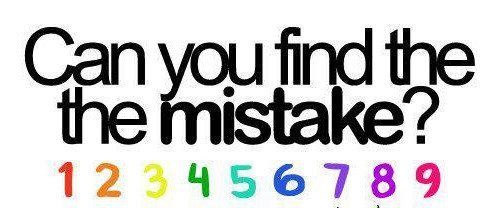How to correct a French Native speaker?
It’s the interesting part when you start to know something that natives don’t. Languages can be tricky. In French like in other languages some rules are too difficult to use and that’s why sometimes we don’t use the ‘ne’ part of the negative, or we use ‘on’ instead of ‘nous’ (usage can be wrong also but as soon as the majority use it, it can become the rule). This post shows common mistakes by French speakers.

Spoken mistakes
“Si j’aurais su…”
It’s everywhere, and the movie “la guerre des boutons” (si j’aurais su, j’serais pas venu) is a good illustration. Kids, foreigners and French themselves make the mistake. Here you need to use “imparfait” then “conditionnel”.
> Si j’avais su je serais pas venu
“Aller au coiffeur” / “le vélo à mon père”
It’s common hearing French people using “à, au” instead of “de”. We say:“Aller chez le coiffeur, le boulanger, le pharmacien” because it’s a person. We say “Aller au salon de coiffure, à la boulangerie, à la pharmacie” because it’s a place. If the following word is a personal pronoun, we can use “à”. In any other case, it’s “de”. C’est une idée de Jean/C’est une idée à lui.
“Y’en a qui croivent”
French conjugation is hard and we French are not good with it too so some French say “ils croyent [krwaj]/ils croivent” instead of “ils croient [krwa]”. The verb is “croire” and not “croiver”. The same for “voir”. We hear “ils voyent [vwaj]” instead of “ils voient [vwa].
“C’est qui qui…”
There are many ways to ask a question in French and I think you learned the inversion-style “où habites-tu?”. In spoken French this sounds weird. People reverse the inversion (!) and say “où t’habites?” or “t’habites où?”. But it sounds funny and not correct when we say “c’est qui qui dit ça?” instead of “qui est-ce qui dit ça?”. Kiki (qui qui) sounds cute but it’s wrong.
“Malgré que…”
We should say “malgré que” only with “avoir” in the subjonctive tense. Otherwise we drop the “que” and say “malgré la pluie” or “malgré le fait que…” Why? I don’t know both sentences sounds ok and this mistake spreads more and more even in literature.
“Faire montrer”
“Montrer” already means “faire voir” (to show). Saying “faire montrer” is like saying “faire faire montrer”.
“Les gens qu’ils habitent à Paris”
The last one is a confusion between “qui” and “qu’ils”. In spoken French we tend to pronounce “i” instead of “il” in some cases. For example “i fait chaud” for “il fait chaud” or “i(l)s_ont faim” (dropping the L but keeping the liaison) for “ils_ont faim”. Maybe that’s why some people think it’s a conjonction de subordination “que+il” when it’s actually a relative pronoun “qui”. We can hear “Les gens qu’i(l)s_habitent à Paris” instead of “Les gens qui habitent à Paris”.
A few written mistakes
When you write something in French, it can tell quickly who you are, your social and cultural background and also how much do you care about people. Good writing skills it’s a bit like pronunciation.
“Comme même”
“Quand même” is one of the famous French filler words but some French (most youngsters) think it should be written “Comme même”.
«J’ai manger»
The sound is the same so this mistake is the most common one. The most famous is in a tragic story that happened in France in the 90’s. A woman was killed by her gardener called Omar. “Omar m’a tuer” (Omar killed me) was written with her blood on the wall beside her body (the correct spelling is “Omar m’a tué”). But the thing is this woman was very literate so it’s not possible that she wrote this herself. It means someone wanted to accuse Omar. Have a good spelling can help you to hide your crime. -ER ending are infinitives. -É endings are participle.
Finally, mistakes are part of the process of learning languages and the more mistakes you make, the more you’ll have chance to have a feedback and the more you improve. And language is alive and still changing, whatever thinks the grammar nazis:

Pingback: How Hard Is the DELF B2? - It's French Juice!